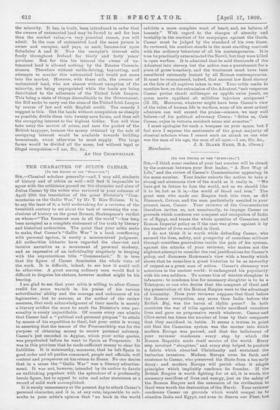THE CHARACTER OF JULIUS CAESAR.
[TO THE EDITOn O TIM SrECTATOtt."]
SIR,—Classical scholars generally—and, I may add, students of history and of ethics as well—will find it impossible to agree with the criticisms passed on the character and aims of Julius Caesar by the writer who reviewed in your columns of April 10th the translation of the great Dictator's " Com- mentaries on the Gallic War," by Mr. T. Rice Holmes. It is, to say the least of it, a bold undertaking for a reviewer of • the twentieth century to set about the task of reversing the con. elusions of history on the great Roman, Shakespeare's verdict on whom—" The foremost man in all the world "—has long been accepted as a complete statement of the truth by literary and historical authorities. The point that your critic seeks to make, that Caesar's "Gallia War" is a book overflowing with personal egoism, is surely a misconceived judgment. All authorities hitherto have regarded the clear-cut and incisive narrative as a monument of personal modesty, and as expressive of an individuality singularly in keeping with the unpretentious title " Commentarii." It is true that the figure of Caesar dominates the whole vista of the work. It is difficult, indeed, to see how it could well be otherwise. A giant among ordinary men would find it difficult to disguise his stature, however modest might be his bearing.
I am glad to see that your critic is willing to allow Caesar credit for some warmth in his praise of his various subordinates' ability and the courage and endurance of his legionaries; but to assume, as the author of the review assumes, that such acknowledgment of their merits is merely a literary artifice the more to exalt the Dictator's own per- sonality is surely unjustifiable. Of course every one admits that Caesar had a "political and personal purpose" to attain by means of his expedition to Gaul, but your critic is wrong in asserting that the tenure of the Proconsulship was for the purpose of obtaining money to secure personal solvency. Caesar's jest recorded in Appian, which your critic quotes, was perpetrated before he went to Spain as Propraetor. It was in this province that he made sufficient money to clear his liabilities. It is noteworthy, moreover, that he left Spain in good order and all parties concerned, people and officials, well content and prosperous on his return to Rome. No one denies that in a sense the "Gallic War" was a literary advertise- ment. It was not, however, intended by its author to dazzle , an unthinking populace with the splendour of a professedly heroic figure, but to appeal to calm and sober statesmen as a record of solid work accomplished.
It is surely unnecessary at the present day to attack Caesar's personal character, and it is, at any rate, impossible to ,sub- scribe to your critic's opinion that "no book in the world exhibits a more complete want of heart; and, we believe, of honesty." With regard to the charges of atrocity and brutality in the conduct of his campaigns against the Gauls, Caesar must be judged by the standard of his own times. So reviewed, his conduct stands in the most startling contrast with the ordinary behaviour of all his contemporaries. It is true he practically exterminated the Nervii, but they were killed in open warfare. It is admitted that he sold thousands of the Aduatuci into slavery, but the action was a punishment for a piece of gross treachery, and the treatment must have been considered extremely lenient by all Roman contemporaries. It must be remembered, indeed, that ancient law fixed slavery as the fate of all captives taken in war. Your critic omits to mention how, on the submission of the Aduatuei," sub vesper= Caesar portas claudi militesque ex oppido exire jussit, no quern noctu oppidani ub militibus injuriam acciperent " (IL 33). Moreover, whatever might have been Caesar's view of the value of human life in warfare, none of his most ardent admirers can well exceed the praise—sincere, we may well believe—of his political adversary Cicero: "Solos es, Caie Caesar, cujus in victoria ceoiderit nemo nisi armatus."
I must apologise for such a trespass on your space, but I feel sure I express the sentiments of the great majority of classical scholars when I resent such an attack on one who was the man of his age, the man of all ages.—I am, Sir, tkc., J. S. BLAKE REED, B.A. (Oxon.) Manchester.






































 Previous page
Previous page